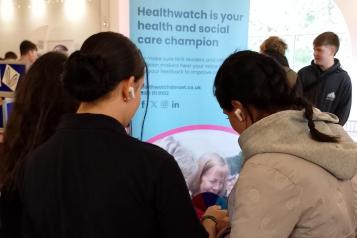Report highlights need for improvement to essential pharmacy services in Dorset

According to our survey, the majority of respondents found their local pharmacy easy to access, with particularly positive experiences reported for online pharmacies. However, the data also uncovered concerning challenges in more rural areas, where some pharmacy closures, reduced hours and supply issues are having a significant impact on people's ability to obtain necessary medications.
The report details troubling accounts of medication shortages leaving people feeling anxious and unsupported. These supply chain disruptions not only inconvenience patients but can also have serious consequences for their health and wellbeing.
"If I can’t access the medication, then I have to deal with the symptoms of ADHD which can be pretty severe. There are times when I feel very agitated and frustrated and the medication calms that down, but I can’t access it."
Pharmacy First aims to provide timely, local healthcare support by enabling patients to consult pharmacists for minor health concerns without needing to see a doctor first. However, the scheme’s success largely depends on raising public awareness alongside clearer information around age restrictions and limitations of the conditions treated.
Key findings
- People find their local pharmacy easy to access when it’s within walking distance or has parking, has friendly staff and when its opening hours suit them.
- Pharmacy closures and reduced hours are having a significant impact on access for people in more rural areas.
- Those who use an online pharmacy gave mostly positive feedback.
- Some people had problems getting their medication. These shortages have left people feeling helpless, frustrated and at potential risk of harm.
- Some people with a disability are not getting the reasonable adjustments that would help them.
- Most people we spoke to get free prescriptions but some told us they either delay getting their prescription because of cost or can only afford medicines for some of their family members.
- 63% of people who took part in our survey had not heard of Pharmacy First.
Recommendations
The report outlines our recommendations to help shape the pharmacy services to meet the community’s needs effectively:
- Closures and reduced hours: Enable cross-system working to ensure people are better notified of these changes and that pharmacy teams have improved contingency plans for workforce issues.
- Online pharmacies: Wider promotion of online pharmacies to help improve access for local people.
- Medicine shortages: NHS Dorset work with the Local Pharmacy Committee and GP Alliance to ensure that prescribed medication is available for people who need it.
- Pharmacy First: Public information to be clearer on the age restrictions and limitations. Staff should be offered further training and information to ensure that they understand what’s available for whom when referring people to Pharmacy First.
- Reasonable adjustments: Clear expectations of the changes pharmacies should be making to provide medication, information and physical access that meet people’s needs.
- Prescription costs: Widely promote NHS prescription prepayment certificates (PPC) to ensure that people who have regular prescriptions access and benefit from any cost savings available to them.
The findings from the report will feed into the Pharmaceutical Needs Assessment. They have also been shared with Our Dorset Integrated Care System (ICS), NHS Dorset, local unitary councils, the Local Pharmacy Committee and the GP Alliance.
Announcing the report, Louise Bate, Healthwatch Dorset Manager, said: "We are incredibly grateful to everyone who shared their personal experiences with us. The findings offer valuable insights that can help improve pharmacy access and service delivery, including the Pharmacy First scheme, for all Dorset communities."
Jane Horne, Consultant in Public Health, who co-ordinates the Pharmaceutical Needs Assessment for Dorset welcomed the report: "Every three years, the two Health and Wellbeing Boards in Dorset must assess the need linked to pharmacies. Listening to local voices is crucial and this work from Healthwatch will be a key strand in the next Pharmaceutical Needs Assessment."
Fiona Arnold, Community Pharmacy Clinical Lead, NHS Dorset, said: "NHS Dorset highly values patients’ perspectives and feedback to inform commissioning of services in Dorset. It is vital that we have services that meet the needs of our population and that are accessible. We will use this Healthwatch Dorset report on peoples experience of local pharmacy services to inform our work over the coming year."
Read the full report
Local pharmacies: People's experiences of using services in Dorset


